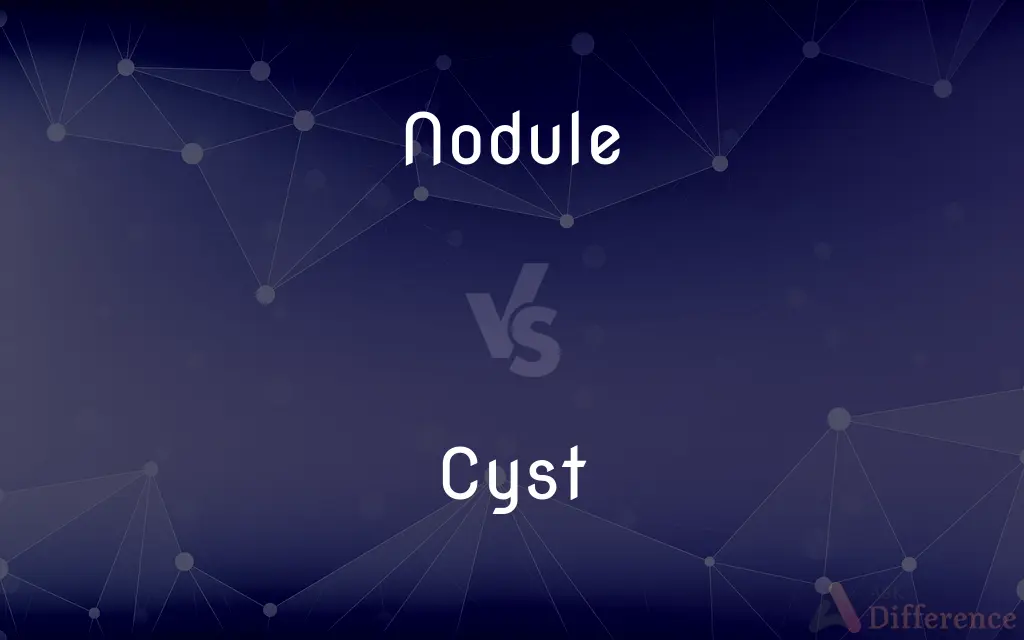Nodule vs. Cyst — What's the Difference?
Edited by Tayyaba Rehman — By Fiza Rafique — Updated on October 10, 2023
A nodule is a small, solid bump or lump; a cyst is a sac-like structure, often filled with liquid, air, or other substances.

Difference Between Nodule and Cyst
Table of Contents
ADVERTISEMENT
Key Differences
Nodule and Cyst are terms often used in medical contexts to describe abnormal growths or lumps found in or on the body. While both represent a type of lump, they possess distinct characteristics and can indicate different underlying conditions. A nodule is generally described as a small, solid bump or lump that can be felt under the skin. It's more solid in nature and doesn't contain fluid or semi-fluid material. On the other hand, a cyst is a closed sac-like structure that can be filled with air, fluid, or other material. Cysts have a distinct membrane separating the inner content from the surrounding tissue.
When examining growths or lumps on organs or tissues, the term nodule might be used. For instance, in the context of the thyroid or lungs, nodules can appear, warranting further investigation. These nodules can be benign or might indicate a malignancy. Cysts, conversely, can form in various body parts, including the skin, ovaries, kidneys, and breasts. They can result from infections, blocked ducts, or other causes, and while many cysts are benign, some can be malignant or precancerous.
From a tactile standpoint, nodules tend to feel harder and are solid masses, while cysts can be softer, especially if they are filled with liquid. For instance, a rheumatoid nodule, which might develop in someone with rheumatoid arthritis, is typically firm. A cyst on the skin, filled with pus or sebum, might feel tender and squishy.
It's crucial to consult medical professionals when discovering any lump or growth on the body. Whether it's a nodule or cyst, early detection and appropriate diagnosis can facilitate effective treatment. Both nodules and cysts can present in various sizes, and while many are harmless, it's essential to rule out serious conditions.
In summary, while both nodules and cysts describe growths or lumps, nodules are solid masses, and cysts are sac-like structures often filled with some substance. The presence of either warrants medical attention to ensure they are not indicative of a more severe condition.
ADVERTISEMENT
Comparison Chart
Definition
A small, solid lump or bump
A sac-like structure filled with liquid, air, or other substances
Nature
Solid
Often filled with substance (liquid, air, etc.)
Common Locations
Organs (like thyroid, lungs)
Skin, ovaries, kidneys, breasts
Tactile Quality
Generally hard
Can be soft and squishy, especially if filled with liquid
Potential Causes
Inflammation, tumors, chronic irritation
Infections, blocked ducts, genetic conditions
Compare with Definitions
Nodule
Nodule can mean a small, solid lesion slightly elevated above the skin surface.
She consulted a dermatologist about the nodule on her arm.
Cyst
Cyst is a closed sac, having a distinct membrane, sometimes containing fluid.
The ultrasound showed a cyst on her ovary.
Nodule
Nodule implies a small, rounded mass of a mineral.
The geologist found a nodule of manganese in the rock sample.
Cyst
Cyst denotes an abnormal pocket or pouch arising from a duct or vessel.
The dentist said the cyst in the mouth might need to be removed.
Nodule
Nodule can describe a growth or swelling on a plant root.
The nodule on the plant root indicated a nitrogen-fixing bacterium.
Cyst
Cyst can describe a larval stage of certain parasites.
The water was contaminated with cysts of the parasite.
Nodule
Nodule refers to a small lump or bump that's solid.
The doctor examined the nodule on his thyroid.
Cyst
Cyst suggests a cavity or container for storage.
The cyst in the organism stored nutrients.
Nodule
Nodule suggests a small aggregation of cells in the body.
The X-ray revealed a nodule in the patient's lung.
Cyst
Cyst implies a membrane-bound compartment in a cell.
The biology student studied the function of the cyst in cell division.
Nodule
A small knotlike protuberance.
Cyst
A cyst is a closed sac, having a distinct envelope and division compared with the nearby tissue. Hence, it is a cluster of cells that have grouped together to form a sac (like the manner in which water molecules group together to form a bubble); however, the distinguishing aspect of a cyst is that the cells forming the "shell" of such a sac are distinctly abnormal (in both appearance and behaviour) when compared with all surrounding cells for that given location.
Nodule
(Medicine) A small, abnormal but usually benign mass of tissue, as on the thyroid gland, in the lung, or under the skin.
Cyst
An abnormal membranous sac in the body containing a gaseous, liquid, or semisolid substance.
Nodule
(Botany) A small knoblike outgrowth, especially one on the roots of a leguminous plant that contains bacteria that fix nitrogen.
Cyst
A sac or vesicle in the body.
Nodule
(Mineralogy) A small rounded lump of a mineral or mixture of minerals, usually harder than the surrounding rock or sediment.
Cyst
(Biology) A small capsulelike sac that encloses certain organisms in their dormant or larval stage.
Nodule
A rounded mass or irregular shape; a little knot or lump.
Cyst
(Botany) A thick-walled resting spore, as in certain algae or fungi.
Nodule
A rounded mass or irregular shape; a little knot or lump.
Cyst
A pouch or sac without opening, usually membranous and containing morbid matter, which develops in one of the natural cavities or in the substance of an organ.
Nodule
A small node
Cyst
(medicine) Of or pertaining to the urinary bladder or gall bladder (in compounds).
Cystectomy, cystitis, cystoscopy
Nodule
Small rounded wartlike protuberance on a plant
Cyst
A pouch or sac without opening, usually membranous and containing morbid matter, which is accidentally developed in one of the natural cavities or in the substance of an organ.
Nodule
(mineralogy) a small rounded lump of mineral substance (usually harder than the surrounding rock or sediment)
Cyst
One of the bladders or air vessels of certain algæ, as of the great kelp of the Pacific, and common rockweeds (Fuci) of our shores.
Cyst
A small capsule or sac of the kind in which many immature entozoans exist in the tissues of living animals; also, a similar form in Rotifera, etc.
Cyst
A closed sac that develops abnormally in some body structure
Cyst
A small anatomically normal sac or bladderlike structure (especially one containing fluid)
Common Curiosities
Can cysts be filled with substances other than liquid?
Yes, cysts can be filled with air, semi-solid material, or other substances.
Can cysts form on the ovaries?
Yes, ovarian cysts are relatively common and can form on or within the ovaries.
Are nodules always hard to touch?
While nodules are generally solid and often firm, their tactile quality can vary based on their location and cause.
Are all nodules indicative of cancer?
No, many nodules are benign, but they should be evaluated to rule out malignancy.
What is a nodule typically made of?
A nodule is typically a solid mass of tissue or cells.
How can one differentiate between a cyst and a nodule by touch?
While both can vary in feel, nodules are typically solid, whereas cysts can feel softer, especially if filled with liquid.
Do cysts always require surgical removal?
No, many cysts resolve on their own, but some might require medical intervention or surgery.
What might cause the formation of a nodule in the lungs?
Causes can include infections, inflammations, benign growths, or tumors, including cancer.
Are nodules on the thyroid common?
Yes, thyroid nodules are relatively common, and while many are benign, they should be evaluated.
Are cysts always benign?
While many cysts are benign, some can be malignant or precancerous and should be evaluated.
Can plants have nodules?
Yes, some plants, especially legumes, have root nodules that house nitrogen-fixing bacteria.
Can cysts cause pain?
Yes, depending on their size, location, and type, cysts can cause discomfort or pain.
Can nodules appear in organs other than the thyroid or lungs?
Yes, nodules can form in various organs, including the kidneys, liver, and more.
Can a cyst become infected?
Yes, some cysts, especially those near the skin's surface, can become infected and might require treatment.
What might lead to the formation of a cyst in the breast?
Causes can include hormonal changes, injuries, or other benign breast conditions, but any new cyst should be evaluated by a healthcare professional.
Share Your Discovery

Previous Comparison
Plait vs. Platt
Next Comparison
Commendable vs. ExcellentAuthor Spotlight
Written by
Fiza RafiqueFiza Rafique is a skilled content writer at AskDifference.com, where she meticulously refines and enhances written pieces. Drawing from her vast editorial expertise, Fiza ensures clarity, accuracy, and precision in every article. Passionate about language, she continually seeks to elevate the quality of content for readers worldwide.
Edited by
Tayyaba RehmanTayyaba Rehman is a distinguished writer, currently serving as a primary contributor to askdifference.com. As a researcher in semantics and etymology, Tayyaba's passion for the complexity of languages and their distinctions has found a perfect home on the platform. Tayyaba delves into the intricacies of language, distinguishing between commonly confused words and phrases, thereby providing clarity for readers worldwide.














































